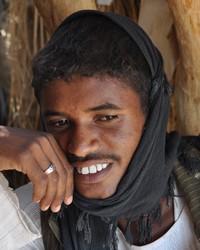Amri in Sudan

Photo Source:
Copyrighted © 2026
Claudiovidri - Shutterstock All rights reserved. Used with permission |
Send Joshua Project a map of this people group.
|
| People Name: | Amri |
| Country: | Sudan |
| 10/40 Window: | Yes |
| Population: | 101,000 |
| World Population: | 101,000 |
| Primary Language: | Arabic, Sudanese |
| Primary Religion: | Islam |
| Christian Adherents: | 0.00 % |
| Evangelicals: | 0.00 % |
| Scripture: | New Testament |
| Ministry Resources: | Yes |
| Jesus Film: | Yes |
| Audio Recordings: | Yes |
| People Cluster: | Arab, Sudan |
| Affinity Bloc: | Arab World |
| Progress Level: |
|
Introduction / History
One of the world's largest and most rapidly growing ethnic groups are the various Arab groups. In the seventh and eleventh centuries, Arabs invaded North Africa, causing many tribes and pre-Islamic Saharan nomadic groups to be displaced. These invasions also overran and absorbed, to some extent, the passive communities of black farmers, Jewish artists and Berber refugees who lived in and around the oases and trading centers of the northern desert. For this reason, many different Arab groups exist throughout North Africa today, including those tribes that have become "Arabized."Arabs are subdivided into thousands of ethnic groups and subgroups based on their particular Muslim sect, Arabic dialect and regional adaptation. One of these Arabized tribes is the Amri people.
What Are Their Lives Like?
Agriculture is the basis of the economy in most Arabized tribes including the Amri. Sorghum and millet are their staple crops, including watermelons, gourds, okra, sesame and cotton. They also raise cattle, sheep, goats, donkeys and dogs. Cheese and butter are made from the milk of both cows and goats.
Amri houses are simple round huts with thatched roofs.
The Amri people of Sudan dress in similar fashion to those people of other Arabic communities. They typically wear sandals, cotton turbans or caps and long-sleeved cotton tunics called djellabas. Most of these groups live much like Arabs of other regions. Their lives revolve around important ceremonies such as birth, marriage, death and the first haircut and circumcision for boys. The most elaborate of all ceremonies is the marriage ceremony. Polygamy (having more than one wife) is a common practice among Arabized tribes. However, according to Islamic law, a man cannot have more than four wives. After marriage, the newlywed couple generally lives with or near the husband's parents. However, in some groups, the young couple will live with the wife's family until after the birth of the first child.
What Are Their Beliefs?
When Mohammed died in A.D. 632, Arabs erupted from the desert pastures of Arabia and overran the lands east and west. They intermarried with the local North African tribes and introduced them to Islam. The tribes began adopting the traditions and practices associated with Islamic culture. The spread of Islam continued and became even more advanced in the sixteenth and seventeenth centuries, when many schools of religious learning were founded. Today, virtually all Arabized tribes are 100% Muslim. They believe that Allah spoke through his prophet, Mohammed, and taught mankind how to live a righteous life through the Koran and the Hadith. Muslims are prohibited from drinking alcohol, eating pork, gambling, stealing, slandering, and making idols. They gather for corporate prayer on Friday afternoons at a mosque, their place of worship.
What Are Their Needs?
The majority of the Arabized tribes are not being ministered to by mission agencies, and that includes the Amri people. Further evangelistic work and much prayer are needed to penetrate the hearts of these precious people with the light of the gospel. Bible portions, audio, and visual Bible resources exist in Sudanese Arabic, the spoken language of Amri people in Sudan, however, they are not presently available to them. Brokenhearted disciples are needed to bring light to these people for whom Christ died.
Prayer Points
Pray for emergency relief teams to provide for the medical needs of the Amri people
Ask the Lord to call people who are willing to go to Sudan and share Christ with the Amri people. Ask the Lord to raise up Christian medical teams to work among the Amri. Pray that Amri communities and families will be transformed with the gospel, growing roots downward and planting strong churches that will plant other churches.